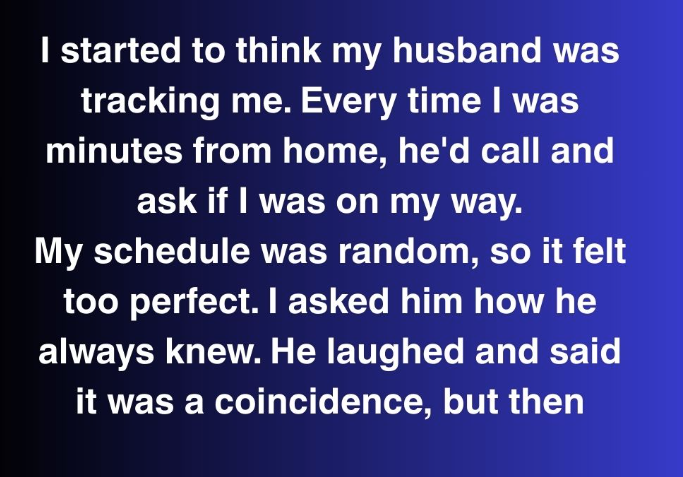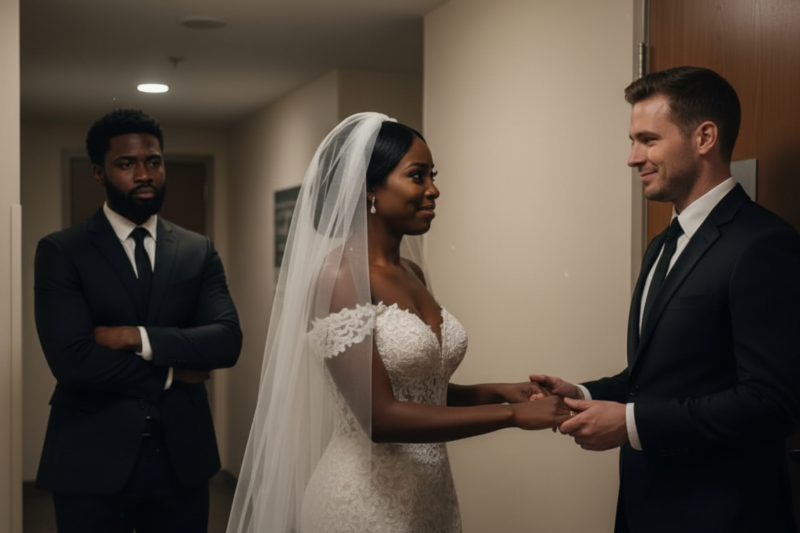I began to suspect that my husband was keeping tabs on my whereabouts. Whenever I was moments from reaching home, Haris would call, casually inquiring if I was on my way.
My schedule was unpredictable, so the timing felt uncanny. I pressed him on how he always seemed to know. He chuckled, calling it a coincidence, but then he started calling even when I took alternate routes or made spontaneous stops.
Initially, I dismissed it. Haris and I had been married for nine years—he was the steady one, always reliable, while I, Naima, was perpetually late or misplacing the grocery list. Perhaps he simply had an instinct for my habits.
But the pattern grew unsettling. One evening, I made an impromptu visit to a new boutique after work, telling no one. As I turned onto our street, my phone rang. Haris asked, “Did you pick up anything cute?” I froze in place.
“From where?” I replied.
“The boutique,” he said, as if it were obvious. “I thought you’d stop there. You’re into that kind of thing.”
I laughed it off during the call, but my nerves were on edge.
Things took a stranger turn.
He’d make comments like, “Did you swing by the pharmacy on your way home?” or “No lunch at work today, right?” These were details I hadn’t shared, hadn’t posted, hadn’t texted.
I went into detective mode. I checked my phone’s location settings—nothing unusual. I scoured my car for hidden devices like AirTags. I even enlisted my tech-savvy brother to inspect my car and handbag for trackers.
Everything came up clean.
So I tried something different. I stopped following through on my stated plans.
One Saturday, I told Haris I was meeting my friend Hema at the farmer’s market, as I often did. Instead, I drove to a cozy used bookstore café across town, spending hours sipping tea and browsing cookbooks.
When I returned home, Haris looked up from the couch with a smile and said, “Was the market closed today?”
My heart sank.
I forced a smile. “Why do you say that?”
He shrugged. “I saw online they were setting up late. Figured you’d be frustrated.”
I wanted to scream.
Two weeks later, I found a clue.
While doing laundry, I pulled Haris’s jeans from the dryer, and something small hit the floor. It was a tiny square tile with a faint “G” logo. I stared at it, puzzled.
Not an AirTag. Not a USB. It resembled a GPS tracker—one of those small, inexpensive ones sold online.
I searched it up right there in the laundry room. Confirmed: a GPS tracking tile, easily concealed in clothing or bags.
My chest tightened.
That night, I stayed silent. I tucked the tile into a Ziploc bag, stashed it under the bathroom sink, and acted as if nothing was wrong. But inside, I was falling apart.
Why was he tracking me? Did he suspect I was unfaithful? Did he distrust me? Or was he hiding something himself?
For the next week, I spiraled. Haris was his usual self—loving, helpful, charming—which somehow made it worse.
I confided in my friend Gia, who offered a perspective that lingered: “What if it’s not about you? What if he’s covering something else?”
I began to see everything in a new light.
There were late-night work calls he took in the garage. A bank statement from an unfamiliar account. And once, when I used his laptop, I noticed a separate user account I couldn’t access without a password.
So I dug deeper, discreetly.
I recalled that the GPS tile likely had a companion app. One afternoon, while Haris was in the shower, I unlocked his phone—I knew his passcode; he’d never hidden it.
I checked his apps. Nothing stood out. But in the “Battery Usage” section, I spotted an icon matching the tracker. The app was hidden from the home screen but still active.
I opened it.
There it was: a detailed log of my movements—locations, stops, times, and dates for the past two weeks.
I took screenshots of it all.
That night, I held back from confronting him. I needed more evidence.
So I did something bold. I followed him.
One Thursday, he mentioned a late work dinner. After he left, I grabbed my keys and trailed him from a distance. He didn’t head downtown. He didn’t go to a restaurant.
He drove to a quiet residential neighborhood I didn’t know. Parked. Got out. And walked into a house.
I waited outside for twenty minutes, trembling, heart racing. Then I drove home.
I didn’t sleep that night.
The next morning, after Haris left for work, I returned to that neighborhood. I walked past the house slowly. It looked ordinary—tidy, with children’s toys scattered in the yard. I memorized the address.
At home, I entered it into Facebook.
That’s when I found her.
Her name was Raquel, a single mom in her mid-thirties with two kids. Her photos showed the same house. In one, blurry but unmistakable, was Haris, holding a bike, helping a child.
I checked her relationship status: “In a relationship.” No name listed, but the comments painted a picture.
“Happy you found a keeper, girl!”
“So thrilled for you and H!”
“He’s already like a dad to them!”
I sat, stunned, for ten minutes.
My husband was living a double life.
That night, I confronted him. I didn’t hold back. I showed him the tracker, the app, the screenshots, the photos from Raquel’s page.
He didn’t deny it.
He sank onto the couch and said, “I was going to tell you. I promise.”
Tell me what? That you’ve been sneaking off to play family with someone else? That you tracked me to keep your deception under control?
He admitted he met Raquel three years ago. She believed he was separated, then divorced. He told her he wanted to move slowly because of his “complicated situation.”
He claimed he loved us both. That he was conflicted. That he “never meant for it to go this far.”
I asked him to leave.
It was chaotic. He pleaded, cried, sent letters. I ignored them. Raquel learned the truth soon after and contacted me, heartbroken. She had no idea. I believed her.
We ended up talking on the phone—two women betrayed by the same man.
She ended things with him too.
But the story doesn’t end there.
A month later, I was at a coffee shop, laptop open, trying to rebuild my life. An older woman, maybe in her sixties, asked to share my table since it was busy. I agreed.
We started chatting. Her name was Farah, and her gentle way of listening drew me in. I poured out my story. She listened quietly, then said something unforgettable:
“Sometimes life clears away what you thought was forever, to make room for what’s real.”
We exchanged numbers and stayed in touch.
I learned Farah ran a local nonprofit helping women navigate divorce and reclaim their independence. Weeks later, I began volunteering there—starting with small tasks like organizing files, then managing social media, and eventually mentoring others.
It gave me a sense of purpose.
Through the nonprofit, I connected with incredible women—resilient, vibrant, full of humor. I found myself laughing again. Cooking for myself again. Growing herbs on my windowsill and dancing alone in my kitchen.
Then, nearly a year later, I had a chance encounter at the grocery store. I bumped into a man, knocking cans from his hands.
His name was Sagan, a widower with a gentle demeanor and warm eyes. We chatted in the checkout line, and he asked if I’d like to get coffee sometime.
I said yes.
Eight months later, our connection feels simple, honest, and calm in the most beautiful way.
Reflecting on it all, I don’t believe Haris set out to ruin anything. But he didn’t stop himself from causing harm, either.
Sometimes, love alone isn’t enough without truth to anchor it.
If something feels off in your life, listen to that instinct. Don’t ignore it. Follow where it leads, even if the path is difficult. Because beyond the pain, there’s space for something greater.
More truth.
More peace.
More of yourself.
If this story resonates with you, share it with someone who might need it. 💛
Like and save to support more authentic stories like this.




